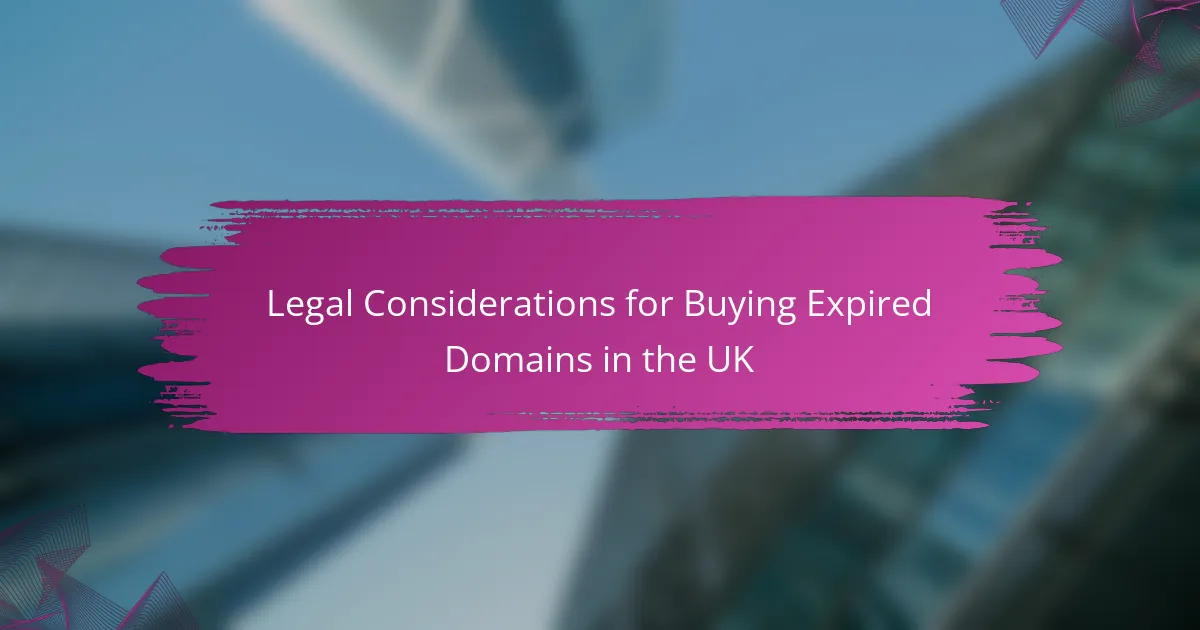When considering the purchase of expired domains in the US, it is essential to navigate various legal risks, particularly those related to intellectual property rights and liabilities from previous content. Conducting thorough due diligence, including checking the domain’s history and ownership details, can help mitigate potential legal issues and ensure compliance with US laws.
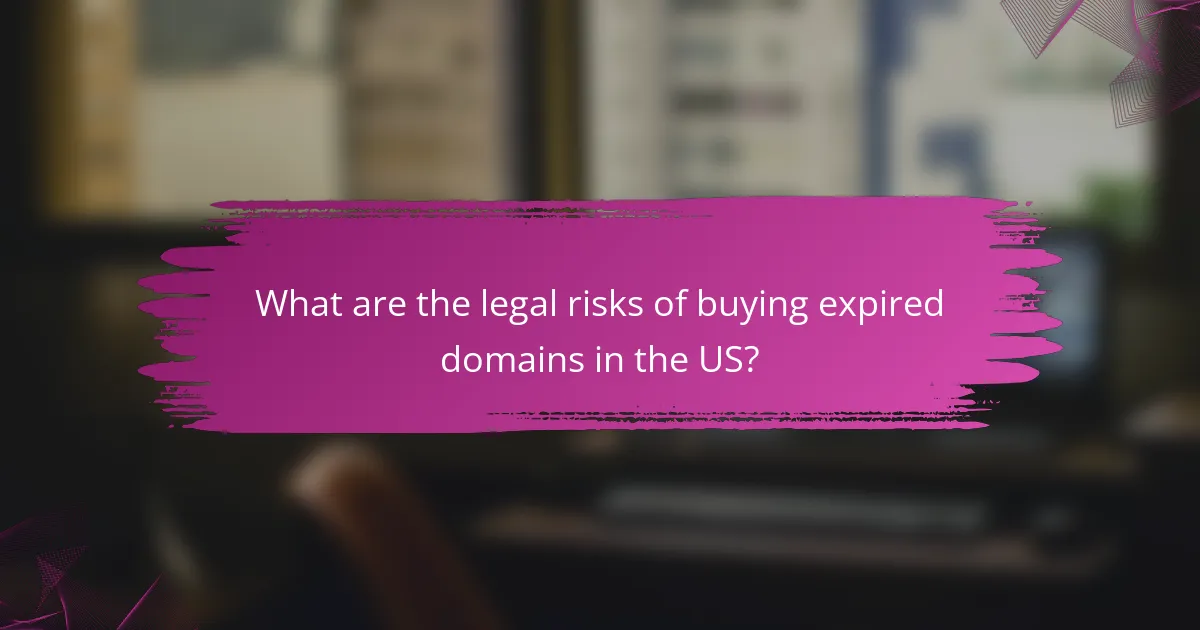
What are the legal risks of buying expired domains in the US?
Buying expired domains in the US carries several legal risks, primarily related to intellectual property rights and potential liabilities from previous content. Understanding these risks is crucial to avoid costly legal disputes and ensure compliance with US laws.
Intellectual property infringement
When acquiring an expired domain, there is a risk of infringing on existing intellectual property rights, such as copyrights or patents. If the domain was previously associated with a brand or product, using it could lead to legal action from the original rights holder.
To mitigate this risk, conduct thorough research on the domain’s history. Check for any trademarks or copyrights linked to the domain and ensure that your intended use does not violate these rights.
Potential trademark issues
Expired domains may have trademark registrations that can complicate ownership. If the domain name is similar to a registered trademark, you could face challenges, including cease-and-desist letters or legal claims from the trademark owner.
Before purchasing, verify if the domain name is associated with any trademarks by searching the US Patent and Trademark Office’s database. If it is, consider whether your use of the domain could be seen as misleading or infringing.
Liability for previous content
Purchasing an expired domain may expose you to liability for any content that was previously hosted on that domain. If the former owner published illegal or defamatory material, you could be held accountable if you continue to use the domain without addressing these issues.
To protect yourself, review the domain’s past content using tools like the Wayback Machine. If you find problematic material, consider taking steps to remove or disavow it before using the domain for your purposes.
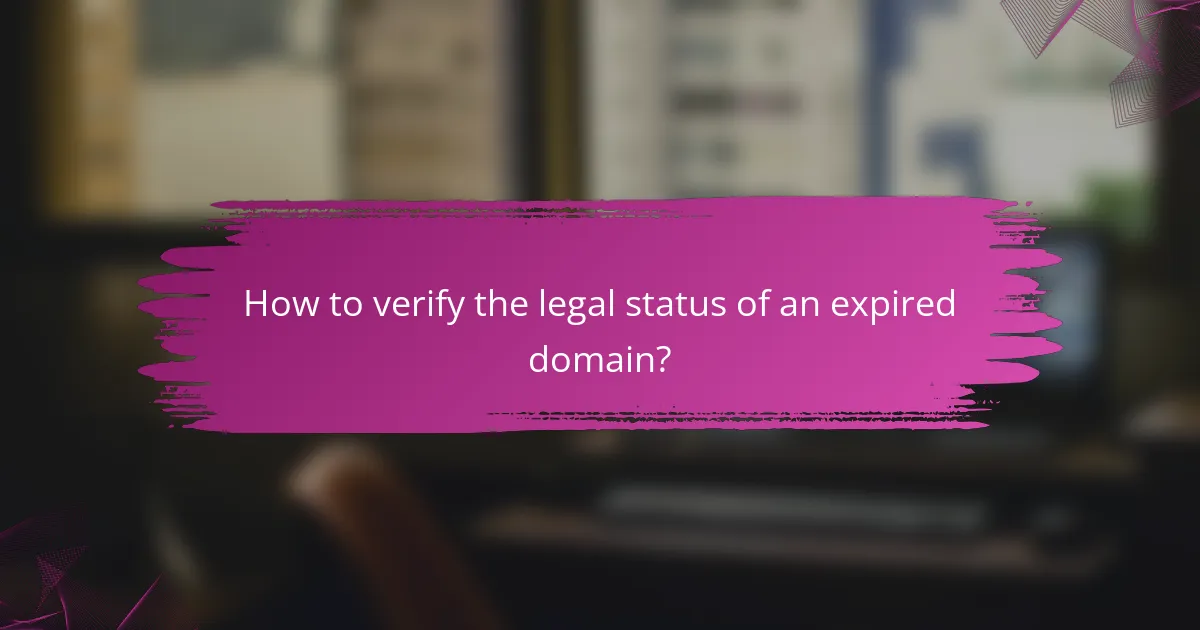
How to verify the legal status of an expired domain?
To verify the legal status of an expired domain, start by checking its history, ownership details, and past content. This process helps ensure that the domain does not have any legal issues or compliance concerns that could affect your use of it.
Check domain history with Wayback Machine
The Wayback Machine is a digital archive that allows you to view past versions of a website. By entering the expired domain into the Wayback Machine, you can see how the site was used previously and identify any potential issues, such as inappropriate content or trademarks.
Look for significant changes in content or ownership over time. If the domain was previously associated with illegal activities or controversial content, it may pose risks for your future use.
Use WHOIS lookup for ownership details
A WHOIS lookup provides information about the current and past registrants of a domain. This data can reveal if the domain was previously owned by a business or individual with a questionable reputation.
Pay attention to the registration dates and any changes in ownership. Frequent changes may indicate a domain with a problematic history, which could lead to legal complications.
Review past content for compliance
Examine the archived content of the expired domain for compliance with legal standards and regulations. This includes checking for copyright issues, trademarks, and adherence to advertising standards.
If the domain hosted content that violated laws or regulations, you could inherit those liabilities. Conduct a thorough review to ensure that the content aligns with current legal requirements in the US.
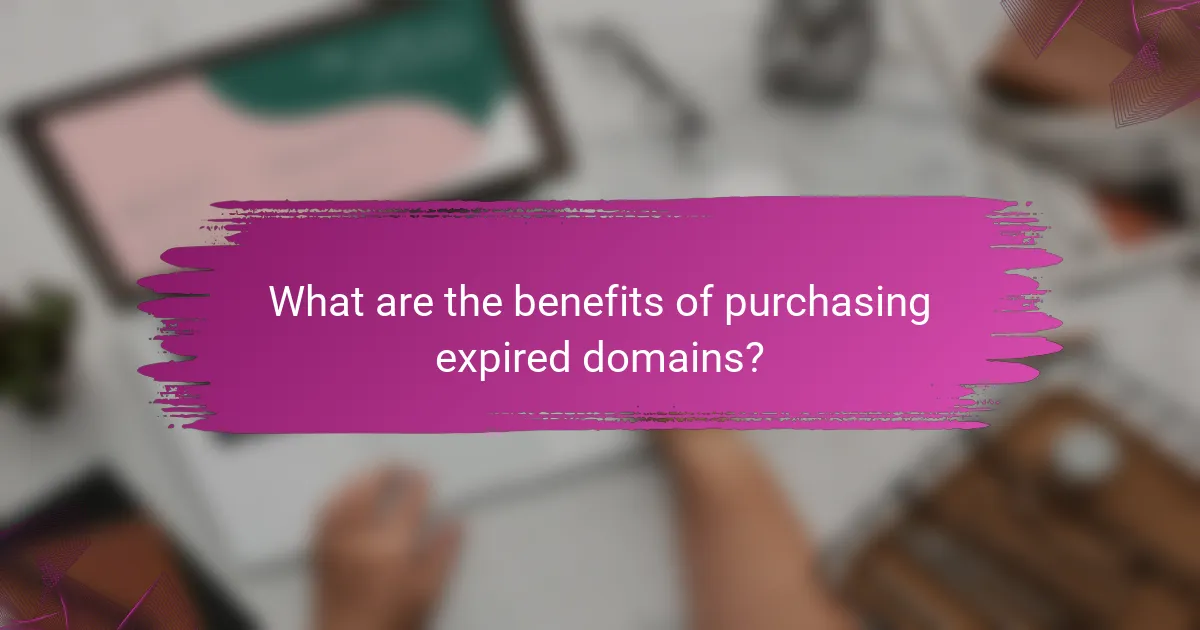
What are the benefits of purchasing expired domains?
Purchasing expired domains offers several advantages, including enhanced search engine optimization (SEO) and traffic potential, established backlinks, and unique branding opportunities. These benefits can significantly impact online visibility and business growth.
Improved SEO and traffic potential
Expired domains often retain some level of SEO value, which can lead to improved search engine rankings and increased organic traffic. When acquiring an expired domain, check its previous performance metrics, such as domain authority and traffic history, to gauge its potential.
Utilizing tools like Ahrefs or SEMrush can help you analyze the domain’s past performance. Look for domains that have relevant keywords and a clean backlink profile to maximize your SEO benefits.
Established backlinks and authority
One of the key advantages of expired domains is their established backlinks, which can enhance your site’s authority. Backlinks from reputable sites signal to search engines that your content is trustworthy, potentially boosting your rankings.
Before purchasing, conduct a thorough backlink audit to ensure the links are from high-quality sources. Avoid domains with spammy backlinks, as these can harm your site’s reputation and SEO efforts.
Branding opportunities
Expired domains can provide unique branding opportunities, especially if they have a memorable name or a history that aligns with your business. A strong domain name can enhance brand recognition and credibility in your industry.
Consider the domain’s previous use and audience when evaluating its branding potential. If the domain has a positive history, it can help you build trust with your target market more quickly.
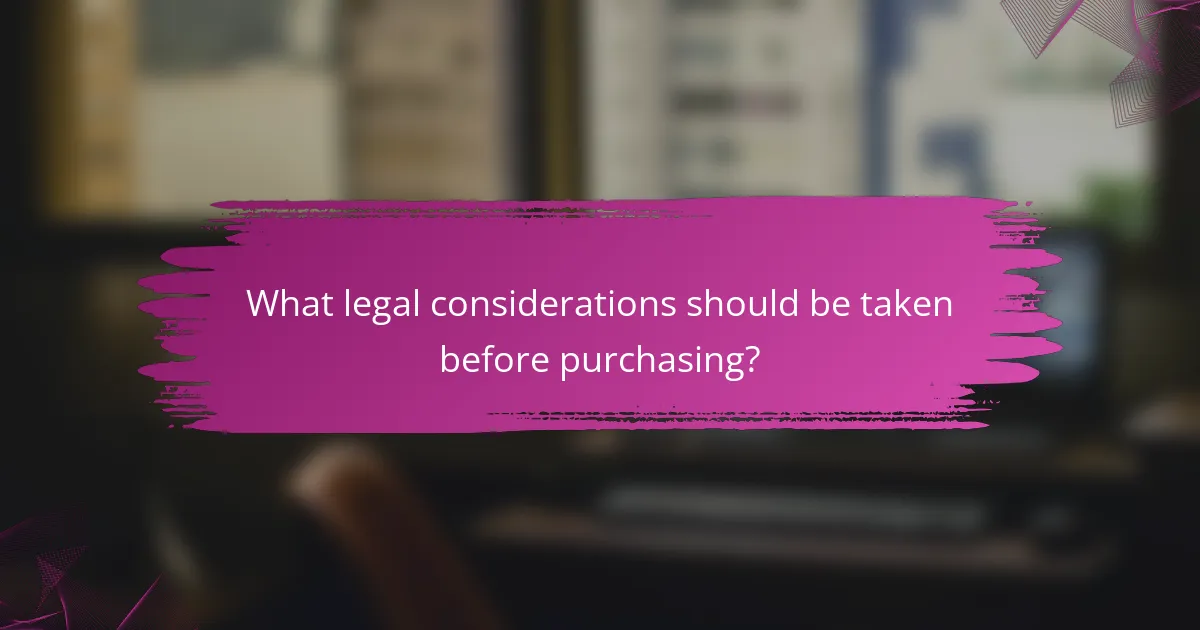
What legal considerations should be taken before purchasing?
Before purchasing expired domains, it’s crucial to consider potential legal issues that may arise, particularly concerning trademarks and domain registration laws. Ensuring compliance with these regulations can help avoid disputes and financial losses.
Conduct a trademark search
Performing a trademark search is essential to determine if the expired domain name is similar to any existing trademarks. If a domain name closely resembles a registered trademark, you risk infringing on the owner’s rights, which could lead to legal action or loss of the domain.
You can use the US Patent and Trademark Office’s online database to check for trademarks. If you find a conflict, it’s advisable to reconsider the purchase or consult with a legal professional to assess the risks involved.
Review domain registration laws
Understanding domain registration laws in the US is vital when buying expired domains. The US operates under specific regulations that govern domain ownership, including the need for accurate registration details and compliance with the terms set by registrars.
Be aware of the potential for disputes over domain ownership, especially if the previous owner had a contentious history. Familiarize yourself with the Dispute Resolution Policy (DRP) and the procedures for resolving conflicts to ensure a smooth acquisition process.
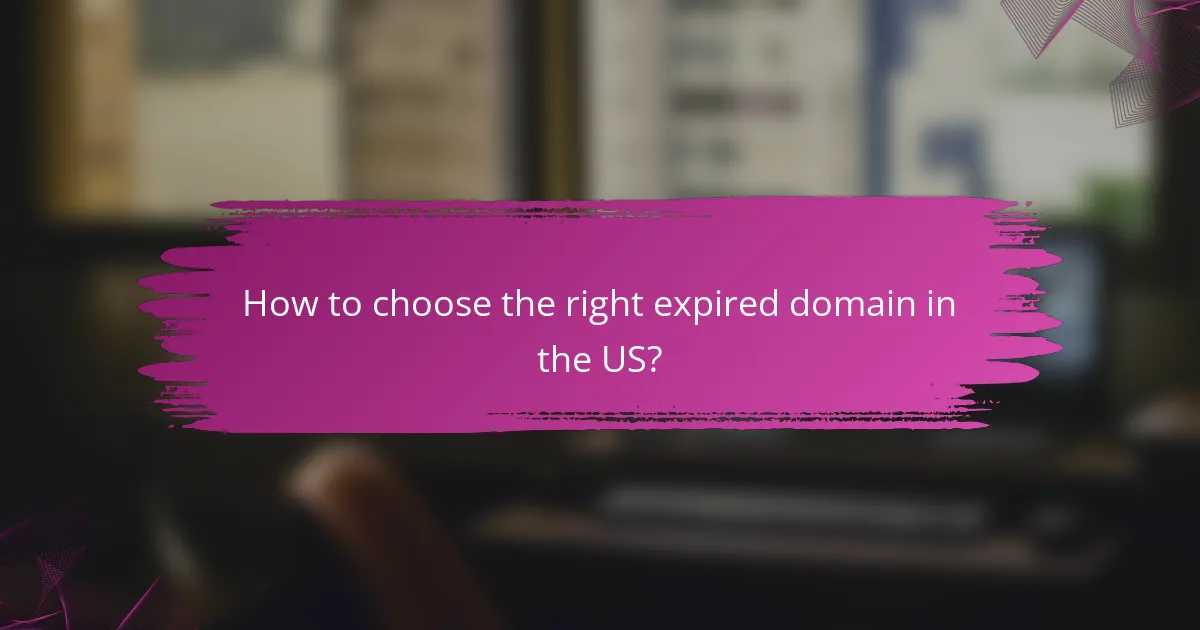
How to choose the right expired domain in the US?
Choosing the right expired domain in the US involves assessing its relevance to your business, its age and authority, and understanding any potential legal implications. A well-selected domain can enhance your online presence and SEO, while avoiding legal pitfalls is crucial for long-term success.
Evaluate domain relevance to your business
When evaluating domain relevance, consider how closely the domain name aligns with your brand or industry. A domain that includes keywords related to your business can improve search visibility and attract the right audience.
For example, if you run a bakery, a domain like “bestbakeryus.com” may be more beneficial than a generic name. Ensure the domain resonates with your target market to maximize its effectiveness.
Assess domain age and authority
The age of an expired domain can impact its authority and SEO value. Generally, older domains with a history of quality content and backlinks are more valuable than newer ones. Check tools like Moz or Ahrefs to assess the domain’s authority score.
Look for domains that have been active for several years and have maintained a good reputation. A domain with a strong backlink profile can provide a head start in search engine rankings.
Consider potential legal implications
Buying an expired domain can carry legal risks, particularly if the domain has a history of trademark issues or has been associated with spam. Conduct thorough research to ensure the domain does not infringe on existing trademarks or copyrights.
Additionally, check for any past penalties from search engines that could affect your future use of the domain. Tools like Google Search Console can help identify any previous issues linked to the domain.
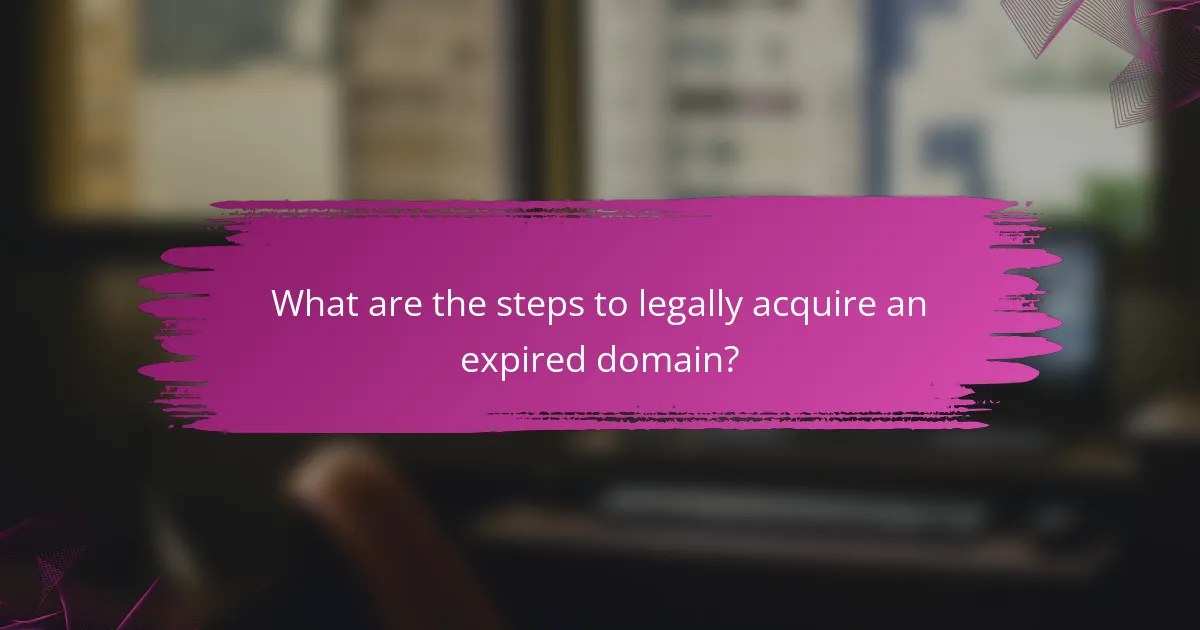
What are the steps to legally acquire an expired domain?
Legally acquiring an expired domain involves a few key steps, including identifying the registrar, completing the purchase, and ensuring proper ownership transfer. Following these steps helps avoid legal complications and secures your investment.
Identify the domain registrar
The first step in acquiring an expired domain is to determine which registrar currently holds the domain. You can use WHOIS lookup tools to find this information, which will provide details about the registrar and the domain’s status.
Once you identify the registrar, check their policies regarding expired domains. Some registrars may have specific rules or waiting periods before the domain becomes available for purchase.
Complete the purchase process
After identifying the registrar, you can proceed to purchase the expired domain. This typically involves creating an account with the registrar and following their checkout process.
Be prepared to pay the registration fee, which can vary widely based on the domain’s popularity and the registrar’s pricing structure. Fees can range from low tens to several hundreds of dollars.
Transfer ownership legally
Once you have completed the purchase, you need to transfer the domain ownership to your name. This process usually requires you to fill out a transfer form provided by the registrar.
Ensure that all contact information is accurate and up to date to avoid any issues with domain management in the future. After the transfer is confirmed, you will receive an email notification, solidifying your ownership of the domain.
